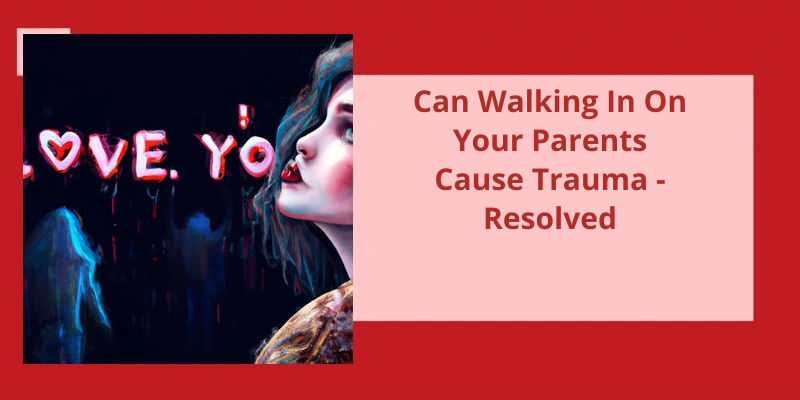Walking in on your parents can be a traumatic experience, especially for children. It can be embarrassing and uncomfortable to witness a private moment between two people, and it can also be confusing and upsetting to see your parents in a vulnerable state. This experience can cause feelings of shame, guilt, and fear, and can lead to long-term psychological trauma. It is important for parents to be aware of the potential impact of this experience on their children and to take steps to ensure that their children are not exposed to such situations.
Could you be traumatized by your parents?
it is possible for children to develop ptsd from their parents. This is due to the fact that trauma symptoms can be passed from parent to child or between generations. It is important to be aware of this possibility and to seek help if needed.
To sum up, it is possible for children to develop PTSD from their parents. This is due to the fact that trauma symptoms can be passed from parent to child or between generations. It is important to be aware of this possibility and to seek help if needed in order to ensure the best possible outcome for the child.
What kind of trauma can be caused by parents?
Adverse childhood experiences can have a lasting impact on a persons life. These experiences can lead to a variety of mental health issues, such as depression, anxiety, and post-traumatic stress disorder. It is important to recognize the signs of these experiences and to seek help if needed.
Adverse childhood experiences can be difficult to overcome, but with the right support and resources, it is possible to heal and move forward. It is important to remember that no one is alone in their struggles and that help is available. With the right support, it is possible to find healing and peace.
What trauma have I experienced from my parents?
Intergenerational trauma is a serious issue that can have long-lasting effects on future generations. It is important to be aware of the potential for trauma to be passed on through parenting behaviors, genetics, and DNA. It is essential to take steps to prevent and address intergenerational trauma in order to ensure a healthier future for all.
Intergenerational trauma is a complex issue that can have far-reaching consequences. It is important to be aware of the potential for trauma to be passed on through parenting behaviors, genetics, and DNA. Taking steps to prevent and address intergenerational trauma is essential in order to create a healthier future for all.
What are the signs that your parents have traumatized you?
childhood trauma can have a lasting impact on a persons life, manifesting in a variety of ways. Common signs of childhood trauma include reliving the event through flashbacks or nightmares, avoidance, anxiety, depression, anger, problems with trust, self-destructive or risky behaviors, and withdrawal. It is important to recognize these signs and seek help if needed.
Childhood trauma can have a lasting effect on a persons life, and it is important to be aware of the signs. These signs can include reliving the event through flashbacks or nightmares, avoidance, anxiety, depression, anger, problems with trust, self-destructive or risky behaviors, and withdrawal. If you or someone you know is experiencing any of these signs, it is important to seek help.
What strategies do you use to cope with trauma caused by your parents?
Healing childhood trauma is a difficult process, but it is possible. By acknowledging and recognizing the trauma, reclaiming control, seeking support, taking care of your health, learning the true meaning of acceptance and letting go, replacing bad habits with good ones, and being patient with yourself, you can begin to heal and move forward.
Healing childhood trauma is a journey, and it is important to be patient with yourself and take it one step at a time. By following the seven steps outlined in this article, you can begin to heal and reclaim control of your life. With the right support and dedication, you can overcome your trauma and live a life of peace and joy.
What should I do if I walk in on my parents?
It is important to remember to apologize for the incident and then leave the situation. It is also important to act normal the next time you see your parents and to block any attempts of theirs to talk about the incident. Lastly, it is important to never bring up the incident again as your parents will be grateful.
Overall, It is important to remember to apologize for the incident and then leave the situation. It is also important to act normal the next time you see your parents and to block any attempts of theirs to talk about the incident. Additionally, it is important to never bring up the incident again as your parents will be grateful. By following these steps, you can ensure that the incident is not brought up again and that your parents are not embarrassed.
If a child walks in on their parents, what should they do?
If you get caught, it is important to stay calm and not panic. Cover yourself or quickly get dressed and walk your child out of the room. You could also calmly ask them to go back to what they were doing and say youll be there in a minute.
To sum up, if you get caught, it is important to remain calm and not to scream or yell. Cover yourself or quickly get dressed and walk your child out of the room. You could also calmly ask them to go back to what they were doing and say youll be there in a minute. This will help to avoid any further embarrassment or awkwardness.
Should you call the police if your parents have kicked you out?
Legally, you cannot kick your child out of the house. You are responsible for her well-being until she is 18 years old and if you abandon her, you could face legal ramifications. It is important to remember that your child is a human being and deserves to be treated with respect and love.
it is important to remember that your child is a human being and deserves to be treated with respect and love. Legally, you cannot kick your child out of the house and you are responsible for her well-being until she is 18 years old. If you abandon her, you could face legal ramifications. It is important to remember that your child is a human being and deserves to be treated with respect and love.
Should you call the police on your parents?
It is important to remember that even if you are 18 and your parents hit you, it is still considered assault and domestic abuse. You have the right to call the police and report the incident.
No matter your age, physical abuse is never acceptable. If you are 18 and your parents hit you, you have the right to call the police and report the incident. It is important to remember that you are not alone and there are resources available to help you.
Examples of what types of family trauma?
Traumatic events can have a lasting impact on a childs mental and physical health. It is important to be aware of the potential for trauma and to provide support and resources to help children cope with the effects of these events. It is also important to be aware of the signs of trauma and to seek professional help if needed.
Traumatic events can have a devastating impact on a childs life. It is important to be aware of the potential for trauma and to provide support and resources to help children cope with the effects of these events. It is also important to be aware of the signs of trauma and to seek professional help if needed. By doing so, we can help children to heal and move forward in life with resilience and strength.
If I call the police on my parents, what will happen?
It is important to remember that if you report abuse, the police may take action and arrest either one or both of your parents. This could result in serious charges, so it is important to consider the consequences before making the call.
Reporting abuse is a difficult decision, but it is important to remember that it could be the best way to protect yourself and your family. If you do decide to call the police, it is important to be aware of the potential consequences.
Have you experienced any trauma as a child that has had a lasting effect on you?
Trauma can have a significant impact on a persons mental health, and the symptoms of trauma can be very similar to those of depression. It is important to be aware of the signs of trauma in both children and adults, and to seek help if any of these symptoms are present.
Trauma can be a difficult experience to cope with, but it is important to remember that help is available. If you or someone you know is exhibiting any of the symptoms of trauma, it is important to seek professional help in order to ensure that the individual is able to cope with the trauma in a healthy and effective way.
If your parents are physically fighting, seek help from a trusted adult or call 911.
It can be difficult to deal with your parents fighting all the time. However, by creating boundaries, creating your own safe space, doing something that makes you feel good, going somewhere else, and talking to someone about it, you can find ways to cope with the situation. It is important to remember that if home isnt safe anymore, there are other options available to you.
Overall, it is important to remember that you are not alone in this situation and that there are ways to cope with your parents fighting all the time. By creating boundaries, creating your own safe space, doing something that makes you feel good, going somewhere else, and talking to someone about it, you can find ways to manage the situation. Additionally, if home isnt safe anymore, there are other options available to you.
Conclusion
The trauma of discovering a parent's hidden addiction can be devastating for a child. It can leave them feeling confused, betrayed, and overwhelmed. Without the proper education and support, it can be difficult for a child to process and understand the situation. It is important for parents to be honest and open with their children about addiction, so that they can provide the necessary support and guidance. By doing so, parents can help their children to better understand and cope with the situation, and ultimately, to heal.






